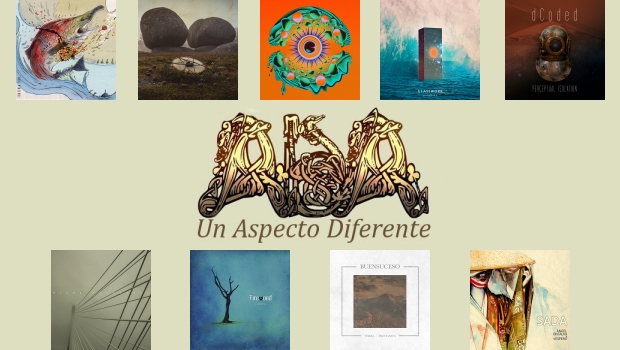In this update we have the first of a two part Spanish ADA Special featuring:
• Fruteria Toñi – El Porvenir Está En Las Huevas
• Moura – Moura
• Abstracción – Abstracción
• Glasswork – Metabolé
• dCoded – Perceptual Isolation
• Blusa – Resonance
• Firewood – Haoma
• Buensuceso – Terra Incognita
• Ángel Ontalva & Vespero – Sada
Earlier this year, a Spanish FaceBook acquaintance gave me a list of ten albums from Spanish musicians he thought I should listen to. Somehow I never made time to listen to any of them, and though I kept the list it somehow slipped to the back of my mind. The list was brought back to my attention when I took on Maud the Moth from the TPA review queue. The name looked familiar, and sure enough, once I checked, her album Orphné was on that list. Having submitted my review for Maud the Moth, I decided now would be as good as ever to finally make time for the other nine albums on the list. First on the list, an album with magnificent cover art!
Nick Hudson
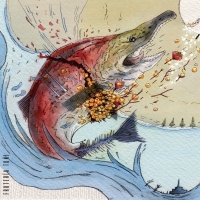
I don’t speak Spanish, but from the French I know, I’m going to guess that the title of this album is something along the lines of “the future is in the eggs” – and some very tasty eggs, these are. Exuberant and energetic, jazzy and symphonic, and caught somewhere between RPI and RIO. The title track is the most delicate and conventionally beautiful, but not for long. After less than a minute, some sleazy sax leads us astray into the next song.
Apart from the title track, the remainder are all long enough to encapsulate several changes within, so it is worth persisting if something isn’t immediately enjoyable. A case in point for me was El Traspié, which on first listening almost had me heading for the skip button, but based on what had come before I assumed at some point a change would come – and sure enough, so it did, and the song became both madder and better.
The final track is considerably restrained, in comparison with what has come before, but quite momentous. I love the bass clarinet and violin especially, but the whole thing is grand, and a perfect finale to a thoroughly enjoyable album.
Nick Hudson
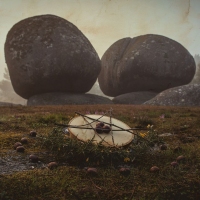
By the Bandcamp tags, this is a psychedelic take on traditional Galician folk. Well I’m not particularly well-versed in Galacian folk, so I’ll take their word for it, but the opening number sure fits the psychedelic bill. I’m at a bit of a loss as to how to describe this band. Perhaps if King Crimson were a stoner band, they might have sounded like this? It’s an eclectic take on the psychedelia of desert rock. Looking at their YouTube page, it would appear the songs that make up this release have been played for 2 to 3 years at least, but they are played with a freshness that belies their age.
Like Fruteria Toñi, the songs are long. Unlike Fruteria Toñi, there are not any great changes within. However, there is sufficient variety to keep attention and interest. As for that Galacian folk, I’m not sure it appeared in the opening number, but there’s definitely a passage in the second number, Da Interzona a Annexia, that must surely derive from that, and it definitely has great impact, and takes the song to a whole new level! I love the way the band can move from bruising heaviness to almost fragile delicacy. Strangely, or perhaps, curiously, O Curioso Caso de Mademoiselle X reminds me of several Finnish bands I like, that dabble in the psychedelic realm.
Nick Hudson
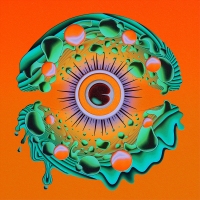
Black Sabbath meets Jethro Tull meets Beardfish, with absolutely gorgeous female vocals, with an almost French chanteuse tone. Despite name-checking Sabbath, this is not a heavy album by any means – but nor were Sabbath solely heavy. Abstracción are definitely reminiscent of some of the more psychedelic Sabbath moments. And when the sitar kicks in, you know you’re in for something quite different. Hammond and sitar might seem an usually pairing, but they work unbelievably well together. Add in the flute and those sultry vocals, and you’ve got quite a heady mix. The music is as bright, colourful and vibrant as the cover art, and so easy to lose yourself in. Abstracción don’t mention folk anywhere on their Bandcamp page, but I wouldn’t be surprised if there is some traditional folk influence to their music. Then again, the band seem to have taken a particularly global influence, with the music not really seeming to belong to any country in particular, so varied are the arrangements and the instrumentation.
This was easily the most instantly engaging of all the albums given to me on that list. Often it is the case that the albums which were harder to digest initially become the ones that give me the most enjoyment over time, while those that gave instant gratification soon lose my interest. Abstracción is that rare gem that impressed immediately, and remains a favourite.
Nick Hudson
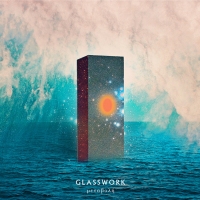
This is the sole band I was already familiar with, as I’d had Glasswork’s previous album recommended to me, back in the day. What I liked about that album was the way it married Wetton/Bruford-era King Crimson with the more modern, heavier sounds of Tool, with a smattering of other ‘70s and ‘90s era influences creeping in. This created a sound quite different from the plethora of retro prog bands, and also the many bands mining the Tool sound.
One band I wasn’t reminded of was Yes. But the vocals on the opening track Metabolé remind me of Jon Anderson. (I like a little Yes, but it’s in spite of Anderson, and I’ve always wished someone else – anyone else! – sang his part on King Crimson’s Lizard.) If I didn’t know about the band from the previous album, I’m not sure I would have made it beyond this first track, which musically is, while quite pleasant and listenable, not particularly exciting either. Blackspot is possibly one of the worst opening numbers I’ve ever come across. Scarily, it also appears to be the lead single for the album. Thankfully, the second track provides the heavier tones I was expecting (though still not as bombastic as the opening track of their previous album), but I’m still unconvinced. Again, if I had not already enjoyed their previous album, I’m unsure if I’d be giving this album so much time before moving on. And, ultimately, that’s how I feel about the album as a whole. There are some songs I enjoy more, and there are some neat passages here and there, but a lot of the magic, originality and uniqueness of Fear and Trembling has been lost.
I intend to, in time, revisit this album, in the hopes I’ve unfairly judged it. But this seems a huge step backwards for the band, to me. Not even the clarinet and sax provided by Fruteria Toñi’s Jesus Sanchez on two tracks, as beautiful as it is, helps when it’s played over Yes that’s more And You And I than Siberian Khatru. However, if you’re a fan of retro prog, or a bigger fan of Yes than I, this album might float your boat.
Nick Hudson
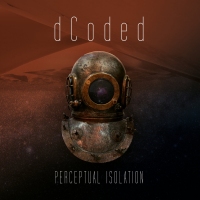
Well this is the first real point of difference in my Spanish journey. dCoded call themselves post rock, and while they certainly have a fair smattering of that in their music, they’re far more upbeat than most post rock bands, with their groove often being funky or jazzy. The music is intricate, ambitious, complex and creative, and though it’s technically precise, it remains organic sounding – which is a far greater feat than that might sound. Often technicality like this leaves me cold, and comes across as a wankfest more for the satisfaction of the musicians than for their audience. The variety in sounds and styles keeps me constantly engaged, yet it all remains remarkably cohesive, thanks to the underlying (and sometimes subtle to the point of being almost non-exist at, yet still there) post rock vibe.
The band chose the longest track on the album to be their lead single, and it’s a shame, because as good as it is, for the first third at least, it’s the most conventional post rock track on the album. There’s a good chance, then, that people might not reach that point, and realise this band does provide something different. If you want a shorter track to acquaint yourself with the band, I’d recommend Ariadna’s Web, which despite its relative brevity is a favourite of mine.
The band has added their cover of Massive Attack’s Teardrop to the album, and it’s an interesting take, with some lovely guest vocals from Vanesa Paris. I honesty believe both the music and vocals of this cover are superior to the original!
Nick Hudson
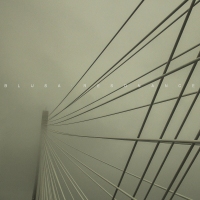
While dCoded describe themselves as a post rock band, but often sound so much more, Blusa describe themselves as an experimental electronic rock band, yet often sound so much more like a post rock band. A very good post rock band, though, I would hasten to add. They also remind me a little of North Atlantic Oscillation. If NAO were an instrumental post rock band, they might very well sound like Blusa. Or maybe not. There are also Krautrock vibes at times. Although a trio, the band often sound as if they number more, such are the squalls of sound they produce. I imagine the band are earburstingly loud when they play loud, with a sound you can feel in your gut. And yet, there are moments of calm and quiet, too.
In this respect, they remind me a little of High Dependency Unit, who could also produce tracks almost ambient in nature, alongside the heavier bangers. Whatever the soundscape, it is all-enveloping, and engaging. This is definitely one of my favourite releases from the list!
Nick Hudson
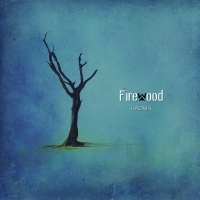
Oh yes, I’m liking this from the first notes of some very tasty, aggressive math rock. Or, at least that’s what it sounded like to me, but I’m hopeless when it comes to genres. There’s no sign of math rock among the Bandcamp tags, so I’m probably wrong. It doesn’t really matter, though, when the music is this good. The driving and insistent groove, against the more laid-back, but still intense, passages makes for a highly engaging opening to the album. The rhythms and melodies are intricate and intertwining. In fact, every track is part of one intertwined whole, so that if you’re not paying attention, the album is over before you’re ready. It’s shorter than the number of tracks suggest, as there are only five full length tracks, but actually it feels like a perfect length. The five longer tracks, accompanied by the shorter passages, merge into one complete piece of music occupying a common thread, and point of reference.
I believe this is the band’s debut, which leaves the impression that this band has a bright future ahead of them. Firewood might be a band to keep an eye on, and I intend to.
Nick Hudson
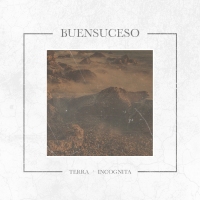
Before I listened, this band posed the most questions. The tags on the Bandcamp page didn’t seem to give a coherent idea of what the band might sound like, particularly when one of the tags was Instrumental, and yet a vocalist was named, and several of the tracks appeared to have lyrics. Actually, Buensuceso do mostly live up to the many varied Bandcamp tags (and the album does include a couple of instrumental tracks…), with an eclectic, yet consistent sound.
There’s a lot I really like about this release, and it’s a tricky album to review – at least, in terms of a concise review of this nature. The mood varies from track to track, so that it really is the case that you get to hear the doomy and sludgy sounds suggested by the Bandcamp tags, as well as more ambient and post rock tones, also suggested by Bandcamp tags. What’s most surprising is how naturally Buensuceso put all of these together, so that it never sounds less than natural when one sound leads to another. A particular favourite track of mine is Silene, with its unexpected and explosive finale, but there’s not a dud track on this album. I even like the harsher vocals, which is highly unusual for me.
Nick Hudson

Sada is the second collaboration between the Spanish jazz fusion and RIO guitarist Ángel Ontalva and Russian psychedelic space-prog rockers Vespero. I’m a fan of Vespero, and have enjoyed several of their releases, but somehow missed the first collaboration with Ángel Ontalva. Based on the strength of Sada, I’ll definitely have to go back and give it a listen.
What’s extraordinary is the way the two contrasting (or, at least, you might have expected them to be contrasting) genres mix. There’s some absolutely neat jazzy guitar, over some spacey backing, and it works incredibly well. The Vespero rhythm section is far more impressive playing a jazzy groove than I expected. The violin works surprisingly well in a jazz setting, too. (I shouldn’t be surprised, as I’ve heard violin played in enough jazz fusion bands before – but not the violin of Vespero’s Vitaly Borodin.) At times, I’m reminded of early Camel, where they played with both jazzy and spacey themes, but these moments are only ever fleeting.
The first half of the album has no real sign of RIO, but this all changes with Day of Truth. The following track at first gives the appearance this was an aberration, returning to the calmer moods of previous tracks. But appearances can be deceiving, and the mid portion of the track contains some wonderful chaos. Given that both Ángel Ontalva and Vespero are well-established acts, and known for the quality of their work, it really comes as no surprise just how good this album is.

